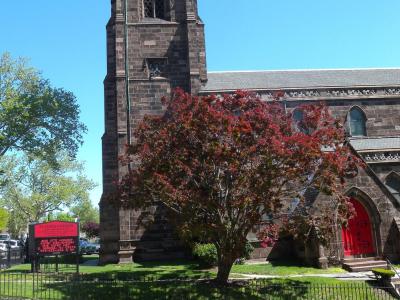St. James A.M.E. Church, Newark
Saint James' A.M.E. Church is a historic landmark that dates back to its construction in 1850 by architect John Welch. Originally known as the High Street Presbyterian Church, it was dedicated in 1854. After a brief period of disbandment in 1926, the church was re-established and renamed as Bethel A.M.E. Church, later adopting its current name, Saint James' A.M.E. Church.
Architecturally, Saint James' A.M.E. Church is notable for its florid Gothic style, designed in the pointed style reminiscent of 14th-century architecture. Constructed from stone sourced from Little Falls, the church is one of John Welch's early projects upon arriving in the United States.
The interior of the church is spacious and cheerful, featuring unobtrusively rich stained glass windows that cast a soft mellow tone throughout the sanctuary. The inviting pews are cushioned in red, complementing the carpets, while the pulpit is crafted from elaborately carved oak. Gas lighting from side brackets and gilt candelabra with five burners each enhance the evening ambiance.
The church's construction reflects meticulous craftsmanship, with its hand-cut stone laid in a Flemish bond pattern. A prominent centrally located tower, styled in Norman architecture with early English elements, adds to the distinctive character of the facade.
Architecturally, Saint James' A.M.E. Church is notable for its florid Gothic style, designed in the pointed style reminiscent of 14th-century architecture. Constructed from stone sourced from Little Falls, the church is one of John Welch's early projects upon arriving in the United States.
The interior of the church is spacious and cheerful, featuring unobtrusively rich stained glass windows that cast a soft mellow tone throughout the sanctuary. The inviting pews are cushioned in red, complementing the carpets, while the pulpit is crafted from elaborately carved oak. Gas lighting from side brackets and gilt candelabra with five burners each enhance the evening ambiance.
The church's construction reflects meticulous craftsmanship, with its hand-cut stone laid in a Flemish bond pattern. A prominent centrally located tower, styled in Norman architecture with early English elements, adds to the distinctive character of the facade.
Want to visit this sight? Check out these Self-Guided Walking Tours in Newark. Alternatively, you can download the mobile app "GPSmyCity: Walks in 1K+ Cities" from Apple App Store or Google Play Store. The app turns your mobile device to a personal tour guide and it works offline, so no data plan is needed when traveling abroad.
St. James A.M.E. Church on Map
Sight Name: St. James A.M.E. Church
Sight Location: Newark, USA (See walking tours in Newark)
Sight Type: Religious
Guide(s) Containing This Sight:
Sight Location: Newark, USA (See walking tours in Newark)
Sight Type: Religious
Guide(s) Containing This Sight:
Walking Tours in Newark, New Jersey
Create Your Own Walk in Newark
Creating your own self-guided walk in Newark is easy and fun. Choose the city attractions that you want to see and a walk route map will be created just for you. You can even set your hotel as the start point of the walk.
Newark's Historical Buildings Walking Tour
Founded in 1666, Newark has no shortage of historic locations: districts, buildings, parks, cemeteries, and other venues. Much of its old-time architecture are notable sites listed on the National Register of Historic Places.
One such is the Essex County Courthouse, a striking example of Renaissance architecture, built in 1904. This grand building, with its impressive marble columns, ornate... view more
Tour Duration: 2 Hour(s)
Travel Distance: 2.8 Km or 1.7 Miles
One such is the Essex County Courthouse, a striking example of Renaissance architecture, built in 1904. This grand building, with its impressive marble columns, ornate... view more
Tour Duration: 2 Hour(s)
Travel Distance: 2.8 Km or 1.7 Miles
Newark Introduction Walking Tour
Newark, the most populous city of New Jersey, is also one of the oldest cities in the United States, established in 1666. Settled by Puritans from New Haven Colony, Newark was initially a theocratic community, which diversified as new settlers introduced different ideas.
Named likely after Newark-on-Trent in England, the city's moniker reveals its colonial roots. Alternative theories... view more
Tour Duration: 2 Hour(s)
Travel Distance: 3.4 Km or 2.1 Miles
Named likely after Newark-on-Trent in England, the city's moniker reveals its colonial roots. Alternative theories... view more
Tour Duration: 2 Hour(s)
Travel Distance: 3.4 Km or 2.1 Miles





